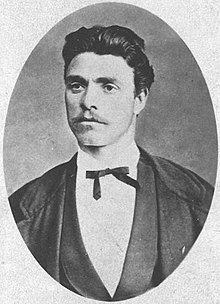Vasil Levski | |
|---|---|
| Васил Левски | |
 | |
| Born | Vasil Ivanov Kunchev 18 July 1837 |
| Died | 18 February 1873 (aged 35) |
| Cause of death | Execution by hanging |
| Resting place | Sofia, Bulgaria |
| Occupation | Revolutionary |
| Known for | Internal Revolutionary Organisation |
| Signature | |
 | |
Vasil Levski[1] (Bulgarian: Васил Левски, spelled in old Bulgarian orthography as Василъ Львскій,[2] pronounced [vɐˈsiɫ ˈlɛfski]), born Vasil Ivanov Kunchev[3] (Васил Иванов Кунчев; 18 July 1837 – 18 February 1873), was a Bulgarian revolutionary who is, today, a national hero of Bulgaria. Dubbed the Apostle of Freedom, Levski ideologised and strategised a revolutionary movement to liberate Bulgaria from Ottoman rule. Levski founded the Internal Revolutionary Organisation, and sought to foment a nationwide uprising through a network of secret regional committees.
Born in the Sub-Balkan town of Karlovo to middle-class parents, Levski became an Orthodox monk before emigrating to join the two Bulgarian Legions in Serbia and other Bulgarian revolutionary groups. Abroad, he acquired the nickname Levski ("Lionlike"). After working as a teacher in Bulgarian lands, he propagated his views and developed the concept of his Bulgaria-based revolutionary organisation, an innovative idea that superseded the foreign-based detachment strategy of the past. In Romania, Levski helped institute the Bulgarian Revolutionary Central Committee, composed of Bulgarian expatriates. During his tours of Bulgaria, Levski established a wide network of insurrectionary committees. Ottoman authorities, however, captured him at an inn near Lovech and executed him by hanging in Sofia.
Levski looked beyond the act of liberation and envisioned a Bulgarian republic of ethnic and religious equality, largely reflecting the liberal ideas of the French Revolution and contemporary Western society. He said, "We will be free in complete liberty where the Bulgarian lives: in Bulgaria, Thrace, Macedonia; people of whatever ethnicity live in this heaven of ours, they will be equal in rights to the Bulgarian in everything." Levski held that all religious and ethnic groups live in a free Bulgaria enjoy equal rights.[4][5][6] He is commemorated with monuments in Bulgaria and Serbia, and numerous national institutions bear his name. In 2007, he topped a nationwide television poll as the all-time greatest Bulgarian. Today Vasil Levski is honoured by being a symbol of freedom, celebrations in his home town and sports clubs being named after him.[7]
- ^ First name also transliterated as Vassil, alias archaically written as Levsky in English (cf. MacDermott).
- ^ Унджиев 1980, p. 53
- ^ Family name also transliterated as Kunčev, Kountchev, Kuntchev, etc.
- ^ "Идеи за свободна България". Archived from the original on 11 April 2009. Retrieved 11 April 2009.
{{cite web}}: CS1 maint: bot: original URL status unknown (link), 170 години. - ^ Cite error: The named reference
manovawas invoked but never defined (see the help page). - ^ Crampton 2007, p. 422
- ^ Cite error: The named reference
Pollwas invoked but never defined (see the help page).